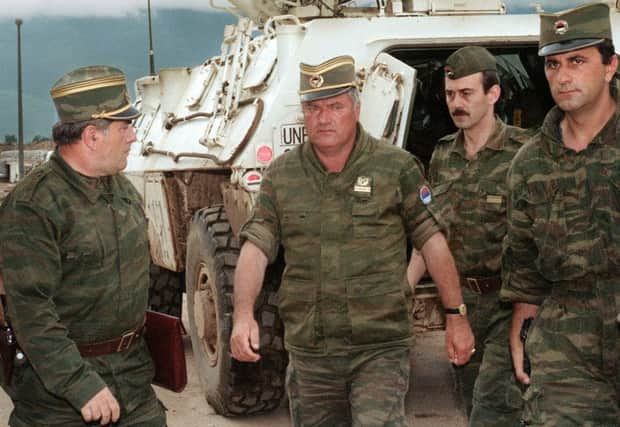Mladic ‘never ordered me to open fire on civilians’


Judges heard from a former Serb army officer who claims he was never ordered to fire on civilians in the besieged Bosnian capital, Sarajevo.
Mile Sladoje, a former assistant commander of a Serb battalion in Sarajevo, was the first witness called by Mladic in his trial on charges including genocide.
Advertisement
Hide AdAdvertisement
Hide AdA summary of his testimony read by one of Mladic’s lawyers made clear Mr Sladoje would deny ever being ordered by Mladic to deliberately target civilians with a sniping campaign – one of the key charges he faces.
Mladic, 72, denies 11 charges of ordering Serb atrocities throughout the 1991-95 Bosnian war. He faces a life sentence if convicted.
The indictment alleges Mladic was the military mastermind behind a deadly Serb sniping and mortar campaign in Sarajevo, and the 1995 massacre of some 8,000 Muslim men in Srebrenica.
He denies the charges and insists his forces were trying to defend Serbs during the conflict that left some 100,000 people dead.
The 72-year-old saluted Mr Sladoje as he entered court at the Yugoslav war crimes tribunal.
“All military activities were defence activities,” Mladic’s lawyer Miodrag Stojanovic told judges in a summary of Mr Sladoje’s seven-page testimony.
Mr Sladoje “never received an order from his superior command, nor did he issue an order … to attack civilian facilities,” Mr Stojanovic said.
Mr Sladoje showed judges a map of Sarajevo dotted with circles that he said were considered legitimate targets by Serb forces.
Advertisement
Hide AdAdvertisement
Hide Ad“There was no part of the city that did not have a military installation or facility,” his written statement said.
Serbs deny systematically targeting civilians with mortars and sniper rifles during the siege of Sarajevo, saying they were shooting at Bosnian Muslim forces holed up in buildings throughout the city.
Mladic was first indicted in 1995 but went into hiding after the war and was not arrested until May 2011. The former general’s trial started a year later and prosecutors wrapped up their case in February.
Mladic, now frail and grey, began by refuting charges relating to the 1992-1996 Sarajevo siege, where a large portion of about 100,000 war deaths during the Balkan wars took place.
As many as 10,000 civilians were killed, sometimes while waiting in line for bread or collecting firewood, by shelling and sniping in one of the longest urban sieges in modern history.
Mladic was arrested in Serbia three years ago after 16 years on the run. Alongside Bosnian Serb wartime political leader Radovan Karadzic, he is accused of genocide for his role in atrocities, including the 1995 Srebrenica massacre of 8,000 Muslim men and boys, considered to be Europe’s worst atrocity since the Second World War.
Mladic’s indictment, first issued in July 1995, alleges that between May 1992 and November 1995, Mladic conducted a campaign of sniping and shelling against the civilian population “the primary purpose of which was to spread terror among the population”.
Mladic has denounced the International Criminal Tribunal for the former Yugoslavia as “satanic”.
Advertisement
Hide AdAdvertisement
Hide AdThe defence argues that he was simply a soldier following orders. His lawyers have described him as a self-proclaimed patriot who fought to defend his people.
His legal team will also attempt to refute the prosecution’s claim that the general led a targeted campaign to ethnically cleanse parts of Bosnia of non-Serbs and make them part of a greater Serbia.
But they are expected to point out that Mladic suffers from a memory disorder that makes it hard for him to differentiate between truth and fiction.